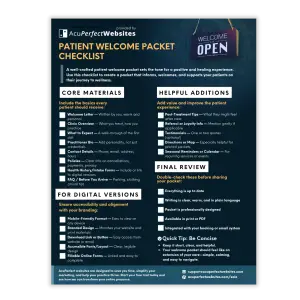(And What Acupuncturists Need to Know to Protect Their Online Credibility)
Artificial intelligence has made writing easier than ever. Tools like ChatGPT and Gemini can generate entire blog posts in seconds, which sounds like a dream for busy acupuncturists trying to keep their websites active. But search engines are catching on and they’re not impressed by what’s being called AI “slop”: mass-produced, generic, and often inaccurate content that lacks expertise or originality.
For acupuncturists, the implications are serious. If your blog reads like it was written by a robot, Google’s algorithms might treat it like one by downgrading your rankings, reducing visibility, and eroding patient trust. Understanding how search engines are adapting is the first step toward creating content that stands out for the right reasons.
The Meaning of “AI Slop”
 “AI slop” isn’t a technical term, but it’s become shorthand for a growing problem: automated content that looks polished on the surface but lacks depth, citations, or personality. In health and wellness blogs, this often takes the form of vague generalizations,
“AI slop” isn’t a technical term, but it’s become shorthand for a growing problem: automated content that looks polished on the surface but lacks depth, citations, or personality. In health and wellness blogs, this often takes the form of vague generalizations,
“Acupuncture has been used for thousands of years to treat many conditions…” or copy-and-paste claims recycled from other websites.
Google doesn’t penalize all AI content, but it has made it clear that low-effort, scaled-up, or misleading content violates its quality guidelines. Its Helpful Content System prioritizes pages written for real people, not for search engines. The March 2024 Core Update further cracked down on what Google calls scaled content abuse, reducing the visibility of low-quality, mass-generated pages by as much as 40% across the web (Animalz, 2024).
In short, using AI tools isn’t the issue. Failing to refine, fact-check, or personalize the results is what leads to penalties.
How Search Engines Detect AI-Generated Content
 Search engines now use AI themselves to detect AI writing. Google’s ranking engineers train machine learning systems to identify linguistic and structural fingerprints that suggest generative text. According to Search Engine Land, Google’s human quality raters are specifically instructed to flag content when the “main content was created using automated or generative AI tools” as low-quality (Search Engine Land, 2024).
Search engines now use AI themselves to detect AI writing. Google’s ranking engineers train machine learning systems to identify linguistic and structural fingerprints that suggest generative text. According to Search Engine Land, Google’s human quality raters are specifically instructed to flag content when the “main content was created using automated or generative AI tools” as low-quality (Search Engine Land, 2024).
This process combines both algorithmic and manual review. Linguistic signals—like predictable sentence patterns, overuse of transition phrases, or missing citations—are measured alongside behavioral signals, such as high bounce rates and low engagement. If users don’t stay on the page or interact with the content, the algorithms recognize that it’s likely not delivering value.
In addition, Google’s E-E-A-T framework—Experience, Expertise, Authoritativeness, and Trustworthiness — guides how health-related content is evaluated. AI-generated blogs often fail in these areas because they lack verifiable authorship, practitioner voice, or firsthand experience.
Why Health and Acupuncture Blogs Are Closely Monitored
 Few types of online content receive as much scrutiny as health information. Google classifies health, medical, and financial topics as Your Money or Your Life (YMYL)
Few types of online content receive as much scrutiny as health information. Google classifies health, medical, and financial topics as Your Money or Your Life (YMYL)
For acupuncturists, this means your website must clearly demonstrate your professional credentials, link to reliable sources, and explain both the benefits and limitations of the treatments you discuss. A page that claims acupuncture “cures insomnia” without context or citations risks being flagged as misleading. Even if the intent is good, failing to present nuanced, evidence-based information can harm both credibility and ranking.
Search engines have learned that trustworthy health content typically includes a human author, contextual explanations, and external references to clinical research or official medical organizations. When those elements are missing, AI detection systems and human raters take note.
The Consequences of Publishing AI "Slop"
 Relying too much on automated writing tools can lead to more than a drop in rankings. It can gradually undermine how patients perceive your clinic. A blog post filled with generic phrases and vague claims feels impersonal, even to a casual reader. Visitors who sense that your content was mass-produced may assume your practice isn’t genuine or patient-centered.
Relying too much on automated writing tools can lead to more than a drop in rankings. It can gradually undermine how patients perceive your clinic. A blog post filled with generic phrases and vague claims feels impersonal, even to a casual reader. Visitors who sense that your content was mass-produced may assume your practice isn’t genuine or patient-centered.
From an SEO perspective, Google’s algorithms also take user behavior into account. When readers leave a page quickly, scroll only a small portion, or fail to click deeper into your site, it signals low engagement. Those data points directly affect your site’s visibility over time.
Even if AI-generated posts help you fill your blog calendar quickly, the long-term effects include diluted credibility, reduced organic reach, and potential compliance issues — especially if inaccurate statements are published under your professional name.
How Acupuncturists Can Avoid Being Flagged
 The best defense against AI slop is a balanced approach. Use AI tools for brainstorming and outlining, but keep control over the message, tone, and accuracy. Every post should reflect your expertise and experience.
The best defense against AI slop is a balanced approach. Use AI tools for brainstorming and outlining, but keep control over the message, tone, and accuracy. Every post should reflect your expertise and experience.
Start by personalizing what AI gives you. Rewrite it using your voice and add clinical insight—such as how acupuncture can be tailored for specific conditions in your practice or how local climate and lifestyle factors influence treatment outcomes. Citing relevant studies or including patient education elements also helps your content demonstrate authority.
Transparency matters, too. Always list your name, credentials, and years of experience on your website. Google rewards visible authorship and clear accountability, especially on YMYL topics. Regularly review older posts to ensure they remain accurate and update them with new research or insights from your clinic.
Above all, remember that quality is more important than volume. Two well-written, educational posts per month will do far more for your SEO and patient trust than a dozen AI-generated filler pieces.
Keeping Content Authentic and Compliant
 There are tools that claim to detect whether content was written by AI, but their reliability is limited. Studies have found that these detectors often misclassify human-written content or fail to recognize edited AI text (BMC Education Integrity, 2023). Rather than depending on them, acupuncturists should focus on consistent human review and quality assurance.
There are tools that claim to detect whether content was written by AI, but their reliability is limited. Studies have found that these detectors often misclassify human-written content or fail to recognize edited AI text (BMC Education Integrity, 2023). Rather than depending on them, acupuncturists should focus on consistent human review and quality assurance.
Analytics can also serve as a practical authenticity check. If your posts consistently show short on-page time or poor engagement, it might indicate your readers aren’t finding the content relevant or engaging enough. Revise and expand those posts rather than deleting them.
If you want professional assistance with consistent, authentic blog writing, AcuPerfect Websites provides TCM-rich articles written by trained professionals—not bots. Each post is crafted to meet E-E-A-T standards and is tailored for acupuncture practices looking to grow their online presence safely and effectively.
The Future of AI and Health Content
 AI detection systems are only getting more sophisticated. Google’s SynthID watermarking technology, for example, embeds subtle identifiers into AI-generated text and images, making them detectable even after editing (Google Blog, 2024). Over time, expect algorithms to evaluate content not just on originality but on authorship consistency, data accuracy, and reader engagement.
AI detection systems are only getting more sophisticated. Google’s SynthID watermarking technology, for example, embeds subtle identifiers into AI-generated text and images, making them detectable even after editing (Google Blog, 2024). Over time, expect algorithms to evaluate content not just on originality but on authorship consistency, data accuracy, and reader engagement.
In the near future, AI might even become part of compliance auditing for health websites. The line between “AI-assisted” and “AI-automated” content will become clearer, and those who rely solely on automation will find it increasingly difficult to rank.
For acupuncturists, this creates an opportunity rather than a setback. The more search engines filter out generic AI content, the more valuable authentic, experience-based writing becomes. Real insights from your clinic, local stories, and patient-education posts will help your website stand out as both credible and trustworthy.
Final Thoughts: Authenticity Wins Every Time
 AI can be a powerful writing assistant, but it cannot replicate human sincerity, clinical judgment, or empathy. Search engines are rapidly learning to recognize those differences—and so are patients.
AI can be a powerful writing assistant, but it cannot replicate human sincerity, clinical judgment, or empathy. Search engines are rapidly learning to recognize those differences—and so are patients.
For acupuncturists, the path forward is clear: use AI tools to make your workflow easier, but never surrender your expertise or voice to automation. Quality, accuracy, and trust will always outweigh quantity and convenience.
If you’re ready to publish content that balances authenticity with SEO performance, AcuPerfect Websites can help. Our team delivers professionally written, search-optimized TCM blog posts designed to attract patients, build credibility, and keep your site compliant with Google’s evolving standards, without falling into the AI slop trap.
Download Our Free Patient Welcome Packet Checklist
 Your first impression can make all the difference in whether a new patient returns. This free Patient Welcome Packet Checklist helps you create or improve your welcome materials so they build trust, set clear expectations, and encourage long-term care. Download it now to make sure your packet supports retention—without missing any important details.
Your first impression can make all the difference in whether a new patient returns. This free Patient Welcome Packet Checklist helps you create or improve your welcome materials so they build trust, set clear expectations, and encourage long-term care. Download it now to make sure your packet supports retention—without missing any important details.
Contact us today if you’re ready to take your website to the next level. At AcuPerfect Websites we can help you establish an online presence that amplifies your new patient efforts.
Get Professional Support
Let us help you grow your practice and become the go-to acupuncturist in your community. Our mission is to help new patients find your practice.
Next Step and Taking Action
 At AcuPerfect Websites, we know acupuncturists are busy. That’s why every Premium and Premium+ plan includes done-for-you, TCM-rich blog posts written by real people. Each post is designed to rank locally, attract patients, and reflect your expertise—without the risks of relying too heavily on AI.
At AcuPerfect Websites, we know acupuncturists are busy. That’s why every Premium and Premium+ plan includes done-for-you, TCM-rich blog posts written by real people. Each post is designed to rank locally, attract patients, and reflect your expertise—without the risks of relying too heavily on AI.
Let us handle the writing so your website builds credibility, ranks higher, and brings more patients through your clinic doors.
Get Professional Support
AcuPerfect Websites has been building acupuncture websites since 2011, and we know exactly what works. Our sites are designed with SEO best practices, easy navigation, and conversion-focused layouts—ensuring that your practice ranks well and attracts new patients.
We can help you grow your practice and become the go-to acupuncturist in your community.
Give your practice the refresh it deserves! Let’s get started!

Need a high quality website for your practice?
AcuPerfect Websites offers website plans for all budgets. Our websites rank well in search results and our features can help save you time and money, accelerate your patient attraction and enable you to manage your practice easier.
We’d be grateful to join you on your practice journey by helping you attract new patients to your practice, so you can do what you love, treat more patients.


